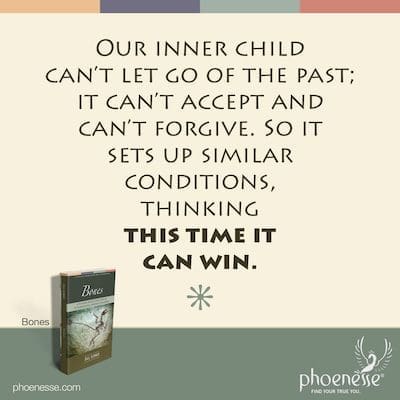Children have more than just a desire to be loved; they want to be loved exclusively, without any limits. In other words, every child’s desire for love is unrealistic. But truth be told, any child could be very happy if they just received real mature love. That would actually do the trick in considerably knocking back their unrealistic demands, the source of so many childhood hurts. Too bad it’s so rare that a parent has the capacity for tendering genuine mature love.

Since they seldom receive an adequate amount of warmth and mature love, children remain hungry for it throughout their whole life. Until, that is, we properly deal with our hurts caused by this lack. When such healing doesn’t happen, we spend our grown-up lives chasing what was missed. And this then makes us incapable of being the ones who might be capable of giving mature love. See what’s happening here? Generation after generation, the cycle gets handed down and continues.
We won’t find any remedies in wishing things were different. And it doesn’t help to hope that people will just learn to start practicing mature love. The only true remedy lies completely in our own hands. Certainly, if we had been one of the lucky few who received mature love, we wouldn’t have this problem to deal with. Which at this point we’re not even fully aware we even have. But that in no way stops us from rectifying things now.
We only need to be willing to become aware that this is what happened. That way we can adjust our former hidden wishes and regrets to match reality. This will not only make us happier people, but we’ll become the rare beings who are now capable of offering mature love to others. Then benign chain reactions can replace the tired vicious circles that have been roiling around us seemingly forever. But let’s be honest, this kind of self-correction is not our normal mode of operating. We’re not alone.
Essentially everyone—even the most diligent spiritual seekers—overlooks just how strong the link is between the unfulfillment of our childhood longings and our present-day problems. This isn’t just a nice theory. It’s very real—about as real as our habit of always looking the other way. So first stop: full awareness. Consider yourself told.
For clarity, let’s understand that mature love is not an all-or-nothing game. A parent may be capable of giving it to some degree. And to be sure, it sometimes happens, in isolated cases, that one parent is able to offer a sufficient measure of mature love. But in such a case, it’s likely the other parent is not. And since this is not a perfect world, children will suffer from the shortcomings of even a loving parent.
Usually, both parents lack the ability to give their children the love they crave. For the child, all this is happening unconsciously; they have no way of even putting their needs into the form of thoughts. And they have no way to compare what they receive with what others are getting. They don’t know that another way exists, so they believe this is the way things should be. Or in extreme cases, the child may feel terribly isolated and believe their lot in life is unlike anybody else’s. Neither of these attitudes is in truth. Either way, the child isn’t conscious of their real emotion. And they can’t come to terms with what’s happening to them.
The result of all this is that the child grows up not understanding why they aren’t happy. Or perhaps they don’t even realize they are unhappy. We often look back on our childhood and are convinced we had all the love we wanted, simply because we actually did get some love.
Many parents give great big demonstrations of love, possibly overindulging their children. This kind of pampering and spoiling is often an overcompensation that acts as an apology for what they suspect, in their hearts, is an inability to give mature love. But children, with their acute ability to sense the truth, see through this. They may not know it in their minds, but inwardly they feel it: Something’s not right here. They can tell genuine love from the over-the-top mushy love they get instead.
As parents, we are responsible for providing proper security and guidance for our children. This calls on us to be the authority. Some parents, however, don’t ever dare punish their children or exert a healthy authority. The reason for this failing is their guilt over their immaturity that prevents them from giving real comfort and warmth. There are other parents who are too harsh, too strict, too severe. They bully the child and don’t allow its individuality to unfold. In both cases, the parents come up short. And the child absorbs their wrong efforts. It hurts.
If our parents were strict, we may wear our rebellion and resentment on our sleeve so it’s fairly easy to trace. When we hide our rebellion though, it can be infinitely harder to follow the trail back to the source. Maybe we had a smothering parent who swarmed us with affection—or more accurately, pseudo-affection—but lacked warmth. Or if we had a parent who conscientiously tried to do the right things but were similarly lacking in warmth, we knew it and we resented it. Yet we may not have been able to put our finger on what was lacking.
In terms of outward appearances, we may have been given what we wanted and needed. So then how could we, with our child’s intellect, possibly have sorted out the distinction between what was real and what was fake? Knowing that something bothered us that we couldn’t explain made us feel uncomfortable and guilty. So we pushed it down into our unconscious, as far out of sight as possible.
And there it remains. As long as the hurts of our early years stay tucked away in hiding, we can’t come to terms with them. No matter how much we might love our parents, unconscious resentments still simmer under the surface. And they block us from forgiving them for hurting us. Quite simply, we can’t forgive and let go of something we’re not aware of.
As adults, we can now see that our parents were mere mortals—human beings with faults like the rest of us. Maybe they weren’t as perfect as we thought and hoped they’d be back then. But there’s no reason to now reject them because they had their own immaturities and inner conflicts. So we need to shine the light of our conscious reasoning onto the tender emotions we haven’t yet allowed ourselves to be aware of.
We need to resolve the conflict between the way we wanted perfect love and the way we didn’t get it. And we must come to terms with the resulting resentment. Otherwise we’re going to manifest situations in our life that are designed to recreate the scenario—so we can fix it. We’ll forever find ourselves stuck in the same old problems and patterns, as though we have a very intense compulsion. Because we do.
One of our favorite ways to attempt to remedy past hurts is through our choice of who to love. We’ll unconsciously choose just the right people who most remind us of the parent who missed the mark by the widest margin. At the same time, we’ll manage to also find traits that are a good match for the parent who we think loved us better. The one who did a better job of meeting our demands.
It’s important to find the way in which both parents are represented. But it’s extra-important—and also more difficult—to find the matching dots for the parent who disappointed us the most. That’s the one we despised the most, the one we loved very little or not at all.
This shows up in our friendships, our marital partners and pretty much all our other relationships. Because we go around seeking out our parents in subtle ways we may have to work to detect. Inside us is this inner child that can’t let go of the past because it can’t make sense of it. So it also can’t accept and can’t forgive. Over and over, it sets up similar conditions, thinking this time it can win.
The inner child is intent on mastering the situation, instead of falling prey to it. Losing feels like being crushed—and this we plan to avoid come hell or high water. The stakes are high indeed. Too bad the whole thing is unfeasible. We can never achieve what the child inside us wants to accomplish. And to boot, our efforts are highly destructive.
First of all, it is a total illusion that we were ever defeated. So then it’s just as big an illusion that we can now be the victor. And sad as it may have been for us when we were little, lack of love is not the tragedy our unconscious self believes it to be. The real tragedy is the way we keep ourselves from being happy now. Because we continue to reproduce situations that were painful under the illusion that “this time we’ll master it.”
Friends, this process is buried deep in our unconscious; it’s the last thing on our mind when we are choosing people to connect with. So we’re going to have to get out the shovel and dig deep if we want to uncover the emotions that cause us to wade into situations again and again where our secret goal is to heal old wounds from childhood.
So here’s the set-up: we will choose a partner who has characteristics similar to one of our parents, and those same aspects will make it just as impossible to get mature love from this person as it was to get it from our parent when we were young. In our blindness, we think that if we just try harder—or are a little more forceful—our partner-parent will yield the goodies. In reality, though, love can’t come like this.
Once we’re free of this repetitive cycle, we’ll stop crying over the spilt milk of not getting love the way we wanted it. Then we can start looking for a friend or partner with the maturity we want and need. When we stop demanding to be loved like a little child, we will become willing to love equally. But no matter how much healing work we have done in other ways or other areas, if this hidden conflict still festers in us, it won’t be possible to love.
If we already have a partner, we can explore how this conflict exists by seeing how they are similar to our parents in some particularly immature aspects. And since we now know how rare really mature people are on this planet, this won’t seem like a tragedy. Even with our own immaturities and shortcomings, we can still develop more mature ways of relating, without the childish compulsion to correct the past always clouding every step.
We have no idea how preoccupied we are with this process. It’s like we’re perpetually reenacting a play hoping ‘this time it’s going to be different.’ And of course it never is. Every disappointment weighs more heavily on us, and our soul becomes more dragged down by all the discouragement. Until we’ve started to pull some of our hidden compulsions and images out of the muck of our unconscious mind, we may hardly be able to believe such things could live inside us. But these are potent parts of our being and they shrewdly go about their business operating in destructive and illogical ways.
Looking at our problems from this perspective, and allowing our unfelt feelings to surface, will give us a lot more insight. But we won’t be able to avoid re-experiencing the hurt of our inner child, even if generally we were also happy as a kid. It’s possible we were both happy and unhappy, so the happy parts may be valid; we’re not deceiving ourselves.
We might be well aware of the parts that went right. But the parts that hurt, where we didn’t receive what we longed for—we didn’t even quite know what that was—we’re not aware of. We took the situation for granted, because we didn’t know what was missing. We didn’t even know anything was missing. If we want to proceed in our spiritual growth, we have to bring all this up to the light and feel the suffering we pushed out of sight. Then we’ll be able to see our current problems in their true light.
How do we do this? We take a current problem and strip it down. Get rid of the rationalizations that prove how the other is at fault. Who cares. Then we look at our anger, our resentments, our anxiety and our frustrations. Behind these lies the hurt of not being loved. Feeling this hurt will reawaken the childhood hurt. It’s the same hurt. No matter how understandable it is that a present unfulfillment hurts, it’s really our pain from childhood that stings so bad.
We must let ourselves feel both. It’s like two picture slides must come together, one that was “then” and one that is “now.” They must gradually slide over top of each other and come into focus. We must see how they are one, how what’s happening now is a recreation of what happened then. That was then, this is now. Going all the way through this process will bring us out of our trance and into current reality.
During this process, we will want to reflect on memories of situations with our parents. How did we really feel about them? What was it that hurt? We will discover that we haven’t forgotten our hurts at all. But we must go beyond intellectual knowledge of our memories and recreations. We must go into our feelings and work our way all the way through to the other side.
Then later we will come to see how we set the whole painful current-day scenario up, in our attempt to right the painful wrong of our childhood. But first we’ll need to work through the weeds of all the overlaying emotions that cover up our old hurts. Until we do that, we can’t come to any better understanding about the past. We won’t be able to recognize the similarities between our parents and the people who hurt us, a pain we need to also experience and let go of on our road to dissolving and healing this conflict. We need to release the pain we feel now, which is inextricably bound to the hurt of then. Then we’ll see how we thought we had to choose this situation or admit defeat.
Some of us are not yet aware that this pain and struggle even exists. In this case, we’ll need to address how we’ve been putting on blinders. It will be helpful to understand that the pain hurts more when we are unaware of it. Ignoring it won’t make it go away, and it won’t make things better.
We have chosen such a head-in-the-sand strategy because the conflict was, in the past, too much for us to look at. But in the long run, a hidden conflict does as much damage, if not more, than one we know about. We can turn our painful feelings into healthy growing pains whenever we become ready to rid ourselves of the bitterness and tension we’ve been hiding.
There are others of us who are aware of the pain, but we white-knuckle our way through it, always expecting a remedy will come along from the outside. In this case, we’re closer to a solution because we will be able to quickly spot how this childish process is playing out. We’ll identify who the person is that we are projecting the offending parent, or parents, onto. Then we can take a different approach to dealing with our pain. At least we won’t have to go searching to find it.
Once we unwind all of this, synchronizing the “then” with the “now,” we will see the folly of what we’ve been up to—how frustratingly useless it has been to try to reign over life and our past hurts this way. With the insights we receive, we will be able to let our parents off the hook.
What a wonderful way to restart our life, leaving our childhood in the past. Forgetting and forgiving will become a real thing that we won’t even have to think about doing. They will naturally occur. We’ll see how we still demand to be loved like a child, and letting this unreal need go, we’ll learn how to really love—by giving love instead of expecting it.
Return to Bones Contents
Read Original Pathwork® Lecture: #73 Compulsion to Recreate and Overcome Childhood Hurts



